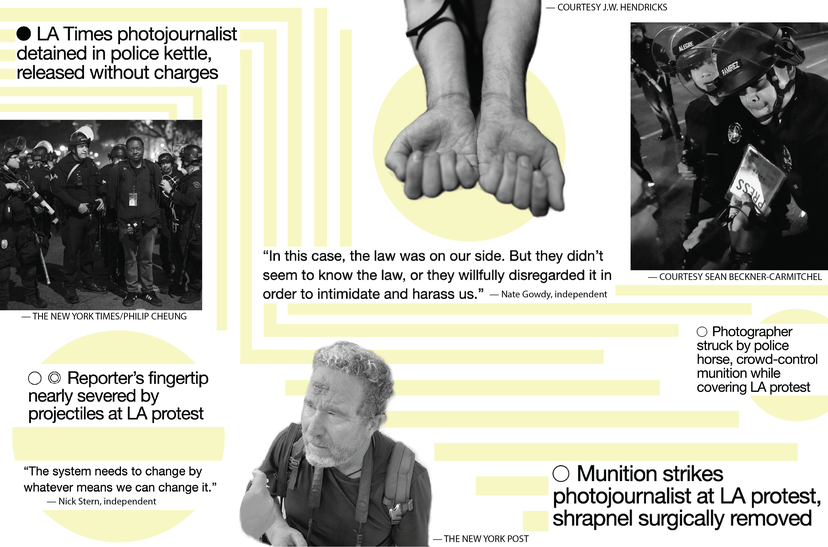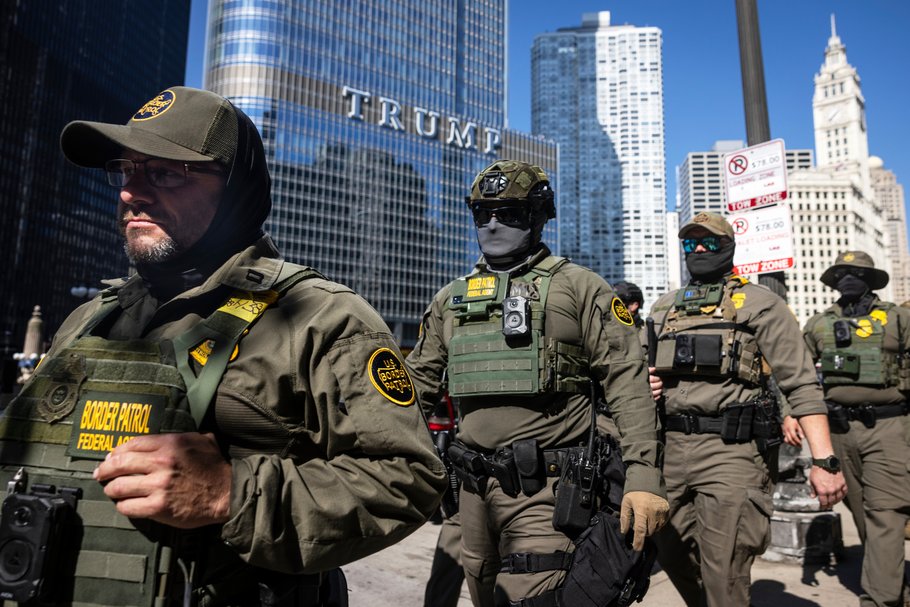- Published On
- September 30, 2025
- Written by
- Kirstin McCudden from Freedom of the Press Foundation
Federal agents from U.S. Immigration and Customs Enforcement and U.S. Customs and Border Protection walk along West Wacker Drive in Chicago on Sept. 28, 2025.
Friends of the U.S. Press Freedom Tracker:
The Tracker team is working to verify and document around a dozen aggressions against journalists in and around Chicago in recent weeks by U.S. Customs and Immigration officers and at immigration policy protests. As we report these press freedom violations, find them in the database.
Watch highlights of this month's newsletter
— Freedom of the Press Foundation
The pace of press freedom news continues to overwhelm. Case in point: On Monday, Sept. 15, President Donald Trump filed a $15 billion (yes, billion) defamation suit against The New York Times and others, claiming the outlet of record defamed him as a businessman. By Friday, a federal judge had summarily dismissed the suit, calling it “decidedly improper and impermissible.”
This one was quick to be thrown out, but the judge did give the president 28 days to refile, meaning we could see it again before October is out. And while I imagine any refiling will be as loudly and ferociously defended by the Times as the first one, we’re making sure we can keep you up to date with all of Trump’s lawsuits against the press.
When Trump became president-elect for the second time in November 2024, we began a specialized tracking project, Media in the Courthouse, to document the oft-changing statuses of his lawsuits against the press in one place. In under one year, he’s now sued three news outlets, including the Times. The other two:
- In December 2024, Trump sued an Iowa pollster and The Des Moines Register for “brazen election interference” using the state consumer protection laws. Gannett, the Register’s parent company, filed to move the case to federal court and have it dismissed altogether. In June of this year, Trump attempted to drop the federal suit, and filed another similar suit in Iowa state court the same day. As of now, the parties are in dispute over jurisdiction. Status: Ongoing.
- In July, Trump filed a $10 billion (again, billion) federal defamation lawsuit against The Wall Street Journal, its parent company and several reporters, alleging that the newspaper deliberately defamed him in its reporting on the Jeffrey Epstein letters. WSJ filed a motion to dismiss on Sept. 22. Status: Ongoing.
Slow legal challenges
- While the Times defamation dismissal came at a breakneck pace, other legal charges against journalists have not moved as quickly. Journalist Mario Guevara has been held in detention by ICE for a long 100-plus days now. Guevara, a Spanish-language reporter covering immigration issues, was arrested in June at an anti-Trump protest in Georgia. He’s filed a federal lawsuit but faces imminent deportation.
- CityBeat investigative reporter Madeline Fening and photo intern Lucas Griffith continue to face criminal charges after being arrested in July while covering a protest. The journalists, who work for a Cincinnati alternative newsweekly, were covering a demonstration at a vigil in support of former journalist Ayman Soliman, an Egyptian immigrant and imam who was detained by immigration authorities. Soliman was released on Sept. 19. Griffith’s trial is scheduled for this week in Kentucky; Fening’s is delayed until January 2026.
After a summer of targeted pushback, major legal wins for journalists in California
We’ve written multiple times this year about the brutal treatment of journalists in and around Los Angeles as they’ve covered immigration policy protests. We’ve documented nearly 70 assaults of journalists in just three months this summer in California and more than a dozen arrests or detainments of journalists.
September, however, brought two major legal wins in the state for journalists targeted by law enforcement.
On Sept. 10, a judge agreed to a preliminary injunction on Department of Homeland Security agents, placing new restrictions against violent tactics while policing protests in the Los Angeles area.
U.S. District Judge Hernán Vera agreed with the plaintiffs in the June lawsuit — multiple journalists, along with press advocacy groups, protesters and legal observers — that DHS seemed to be retaliating against them for First Amendment-protected behavior. His order prohibits agents from dispersing, threatening or assaulting journalists or legal observers without probable cause; using crowd-control weapons and kinetic impact projectiles without threats of imminent harm and before giving two audible warnings; and firing weapons at sensitive areas of the body.
“Under the guise of protecting the public, federal agents have endangered large numbers of peaceful protestors, legal observers, and journalists — as well as the public that relies on them to hold their government accountable,” Vera wrote. “The First Amendment demands better.”
Department of Homeland Security Secretary Kristi Noem has appealed the order.
On the same day, the same judge granted the Los Angeles Press Club and the news outlet Status Coup a preliminary injunction that placed new restrictions on the LA Police Department’s violent protest policing tactics.
“The LAPD’s heavy-handed efforts to police this summer’s protests violated state law, as well as the federal Constitution,” Vera wrote.
The Tracker’s West Coast reporter Briana Erickson brings it all together in a sweeping analysis with interviews from reporters who were on the ground.

Images showing officers detaining and assaulting journalists, and their resulting injuries, during summer 2025 protests in Los Angeles, California.
— Photo illustration/U.S. Press Freedom TrackerOther notable updates and incidents
- Defense Secretary Pete Hegseth placed further restrictions on newsgathering inside the Pentagon on Sept. 19, mandating that journalists pledge to obtain approval for releasing information gathered there, even if unclassified, and threatening to revoke credentials for those who don’t comply. This follows a reduction in physical access within the building in May, when Hegseth required reporters to have official approval and escorts to enter certain areas, and the removal in January of outlets with long-standing Pentagon office space, like the Times and Politico, under the guise of a new media rotation policy.
- On Sept. 12, actor Blake Lively dropped her subpoena against celebrity gossip columnist Perez Hilton after the American Civil Liberties Union of Nevada agreed to represent him. Hilton, who had cited Nevada’s strong state shield law protecting journalists in his motion to quash the subpoena, told the Tracker in an email that the fight had taken a toll. “It was exhausting and OVERWHELMING fighting this by myself for over two months,” he said.
More in the Tracker
As I said up top, the pace of press freedom news continues to overwhelm. For the latest, explore the database and follow the Tracker on social media — we’re on Bluesky, X and Instagram.
